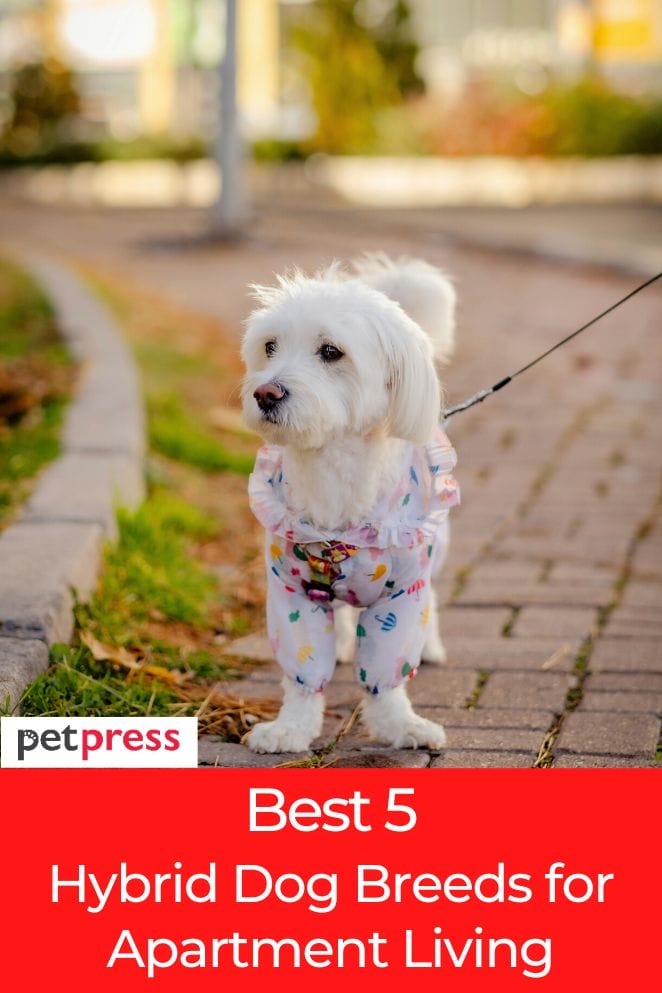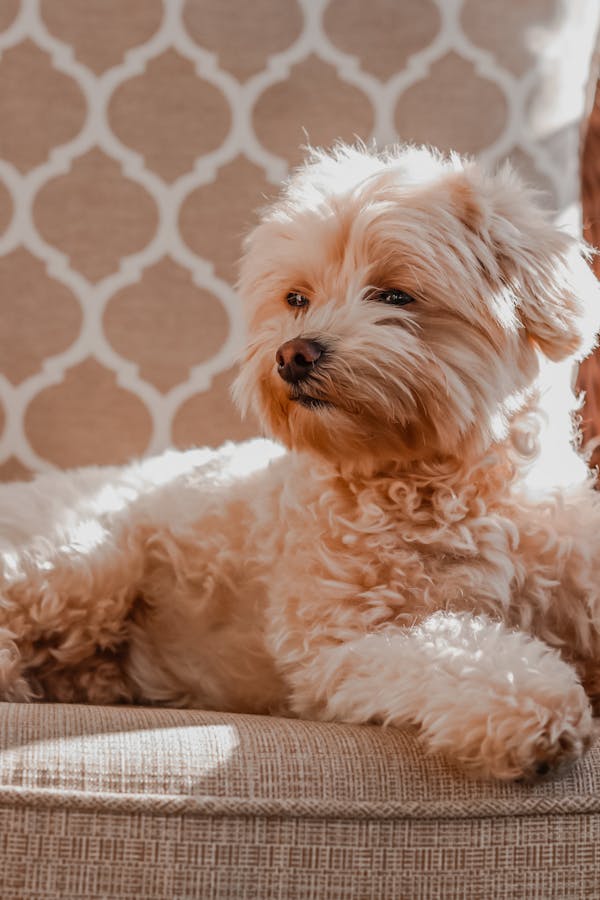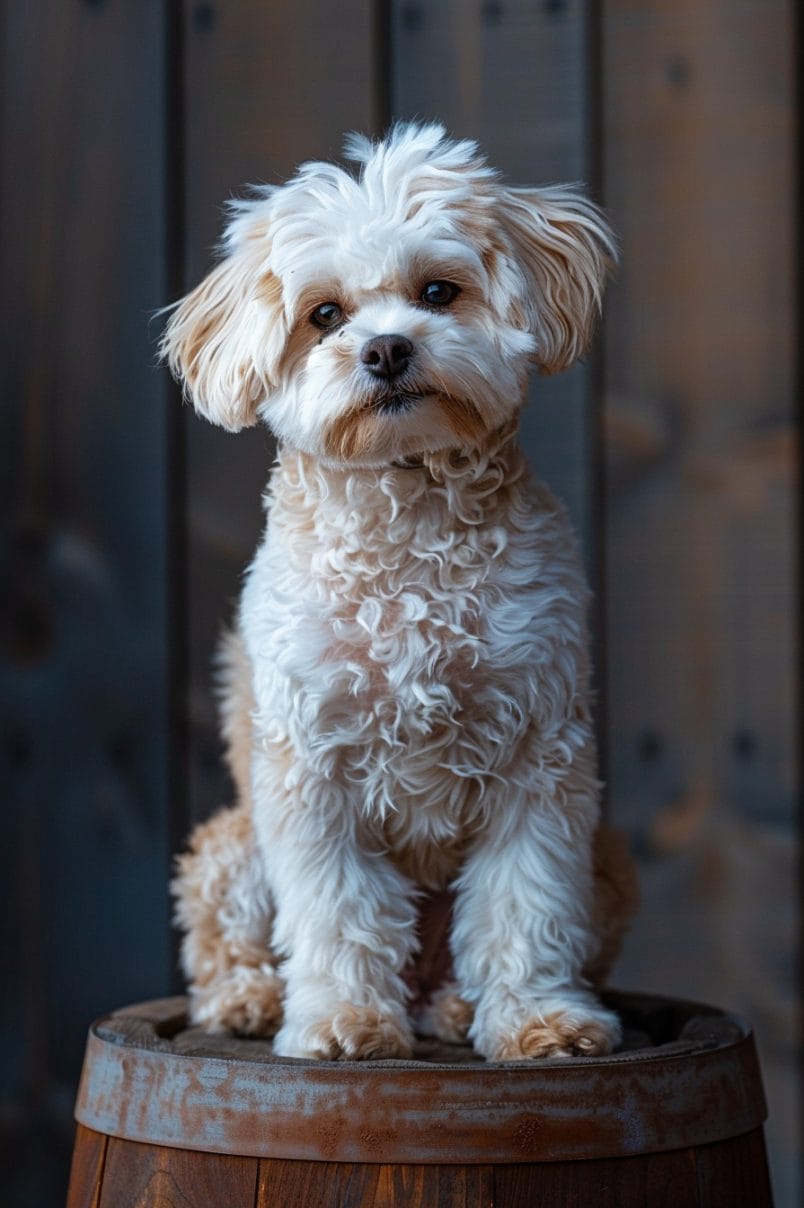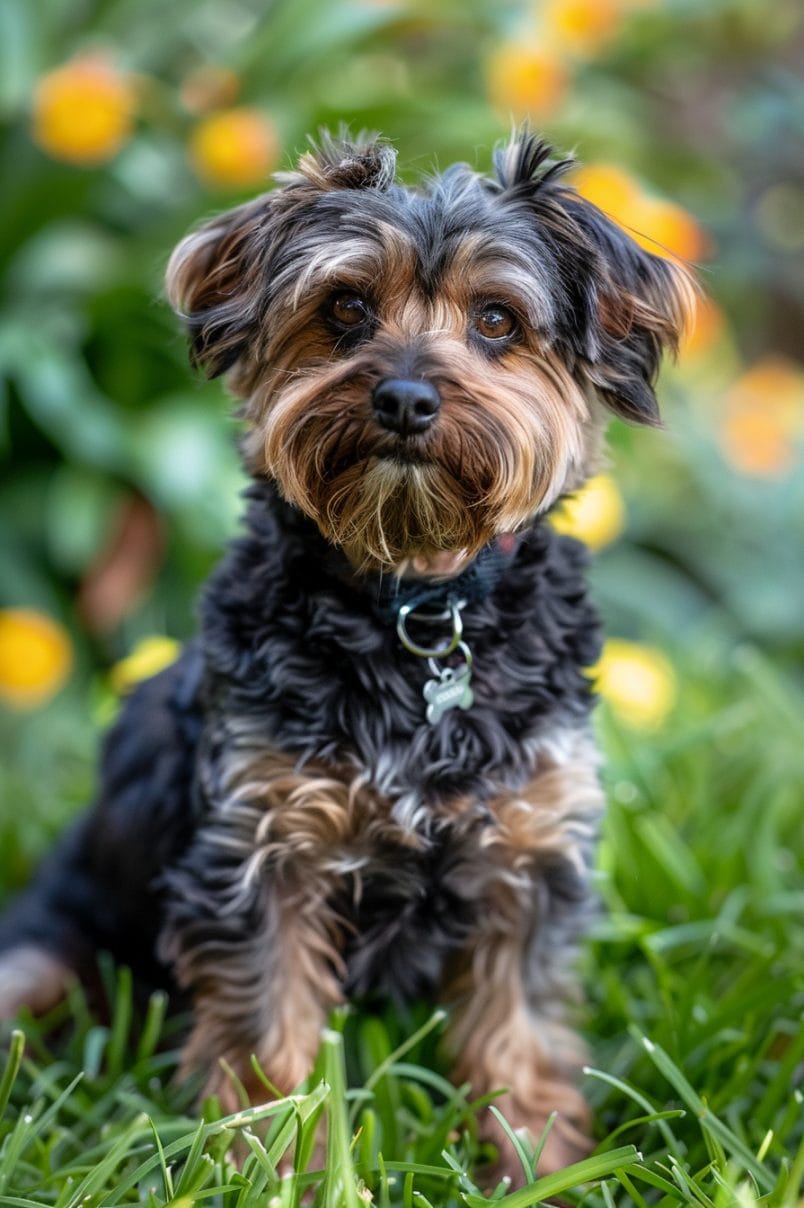
Living in an apartment doesn’t mean you have to miss out on the joys of owning a furry friend.
With the right breed, your apartment can be a cozy home for both you and your pet.
Hybrid dog breeds are becoming increasingly popular due to their unique characteristics and traits.
In this blog post, we’ll explore five of the best hybrid dog breeds that are perfect for apartment living.
5 Best Hybrid Dog Breeds for Apartments
When it comes to choosing a furry companion for apartment living, hybrid dog breeds can offer the perfect blend of size, temperament, and energy levels.
Here are five top picks for apartment-friendly hybrids:
Maltipoo

The Maltipoo is a delightful mix of the Maltese and Poodle breeds.
Known for their compact size, Maltipoos are well-suited for apartment living.
Their small stature means they don’t need a lot of space to move around, and they’re not high-energy dogs, so a short walk or indoor playtime suffices for exercise.
With their friendly and playful demeanor, Maltipoos make wonderful companions for apartment dwellers seeking a loyal and affectionate pet.
Breed overview
| Typical Size | Small |
| Weight Range | 5-20 pounds |
| Temperament | Friendly, Playful, Affectionate |
| Activity Level | Low |
Puggle

A cross between the Pug and Beagle, the Puggle combines the best of both breeds.
Their small size makes them a great fit for apartment life, and their moderate energy levels mean they’re content with short walks and indoor activities.
Puggles are known for their friendly and sociable nature, making them excellent companions for individuals or families living in close quarters.
Breed overview
| Typical Size | Small |
| Weight Range | 15-30 pounds |
| Temperament |
Sociable, Affectionate, Energetic
|
| Activity Level | Moderate |
Cockapoo

The Cockapoo, a mix of Cocker Spaniel and Poodle, is another fantastic choice for apartment living.
These dogs are small in size and adaptable to various living environments.
With their low-energy levels, Cockapoos don’t require extensive exercise, making them suitable for apartment dwellers with busy schedules.
Plus, their affectionate and gentle temperament makes them great companions for all ages.
Breed overview
| Typical Size | Small |
| Weight Range | 10-25 pounds |
| Temperament | Gentle, Intelligent, Affectionate |
| Activity Level | Low to Moderate |
Shih Tzu-Poodle Mix

Combining the Shih Tzu’s charm with the Poodle’s intelligence, the Shih Tzu-Poodle mix is an ideal apartment dog.
Their petite size makes them easy to manage in smaller spaces, and they’re not overly active, so a daily walk or indoor playtime is sufficient to keep them happy.
Shih Tzu-Poodle mixes are known for their sweet and playful personalities, making them beloved pets for apartment dwellers seeking a loyal and loving companion.
Breed overview
| Typical Size | Small |
| Weight Range | 8-18 pounds |
| Temperament | Sweet, Playful, Adaptable |
| Activity Level | Low |
Yorkipoo

The Yorkipoo, a crossbreed of the Yorkshire Terrier and Poodle, is a popular choice for apartment living.
Their small size and minimal shedding make them well-suited for indoor environments.
Despite their diminutive stature, Yorkipoos are spirited and playful, enjoying interactive games and short walks around the neighborhood.
With their affectionate nature and adaptability, Yorkipoos thrive as cherished companions in apartment settings.
Breed overview
| Typical Size | Small |
| Weight Range | 4-15 pounds |
| Temperament |
Spirited, Affectionate, Intelligent
|
| Activity Level | Moderate |
Factors to Consider
Before we dive into the list of the best hybrid breeds for apartments, let’s first discuss some factors you should consider when choosing a dog breed for your apartment:
- Size: Opt for smaller breeds that are easier to manage in an apartment setting.
- Energy level: Choose a breed with lower energy levels, as they require less space to exercise.
- Temperament: Look for breeds with friendly and playful temperaments that are suitable for apartment living.
- Barking tendency: Select a breed that is less likely to bark excessively, which can be problematic in an apartment setting.
- Grooming needs: Choose a breed with minimal grooming needs to make your life easier.
- Health and longevity: Consider the breed’s health and longevity, as some breeds may be more prone to certain health issues.
- Maintenance: Look for breeds with low maintenance requirements, such as feeding and exercise routines.
- Breed compatibility: Ensure that the breed is compatible with your lifestyle and living situation.
- Apartment restrictions: Check with your landlord or apartment complex to see if there are any breed restrictions or size limitations.
- Personal preferences: Consider your personal preferences and lifestyle when choosing a breed.

Pros And Cons Owning a Hybrid Dog Breed in an Apartment
Pros
- Small size: Hybrid breeds are generally smaller than purebred dogs, making them easier to manage in an apartment.
- Low energy levels: These breeds have lower energy levels, which means they don’t require as much space to exercise.
- Friendly and playful temperaments: Hybrid breeds are known for their friendly and playful temperaments, making them great companions for apartment dwellers.
- Less likely to bark: Hybrid breeds are less likely to bark excessively, which can be problematic in an apartment setting.
- Easier to train: These breeds are often easier to train than purebred dogs, making them more suitable for apartment living.
Cons
- Training challenges: Some hybrid breeds may have challenges during training due to their mixed genetics.
- Unpredictable breed needs: The breed needs of hybrid breeds can be unpredictable due to their mixed genetics.
- Limited space for exercise: Apartments may not provide enough space for some hybrid breeds to exercise regularly.
- Potential health issues: Hybrid breeds may be more prone to certain health issues due to their mixed genetics.
- Higher maintenance: Some hybrid breeds may require more maintenance, such as grooming, than purebred dogs.
Conclusion
Choosing the right hybrid breed for apartment living can make all the difference in your pet’s happiness and your peace of mind.
Consider factors such as size, energy level, temperament, barking tendency, and grooming needs when selecting a breed.
The five hybrid breeds listed above are all great options for apartment living due to their small size, low energy levels, and friendly temperaments.
FAQs
Both purebreds and hybrids can be good apartment dogs depending on the breed or mix and individual personality. However, hybrids can sometimes inherit traits that make them better suited to apartments, like lower energy levels or hypoallergenic coats.
Smaller to medium-sized dogs (under 30 lbs) are generally ideal for apartments due to limited space. However, some larger breeds can adapt well with proper exercise.
Exercise needs vary by breed. Some hybrids, like Cavapoos, are relatively low-energy and content with indoor playtime and short walks. Others, like Puggles, might require more walks and active playtime.
Barking tendency can vary by breed mix. Some breeds, like Beagles, are known for barking, while others are quieter. Training and socialization can also significantly impact barking behavior.
- Does Cat Litter Melt Ice? The Complete Guide to Winter Safety - January 30, 2026
- Happy Tail Dogs: Understanding This Common Canine Condition - January 29, 2026
- How Cold Can Outdoor Cats Handle? Feline Winter Safety - January 27, 2026


GIPHY App Key not set. Please check settings